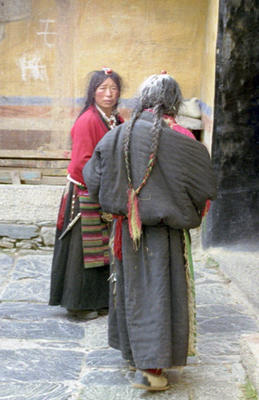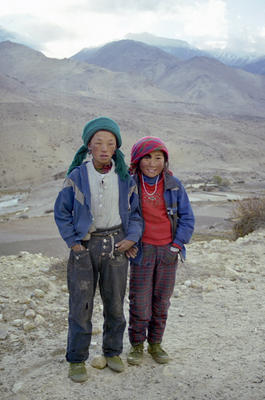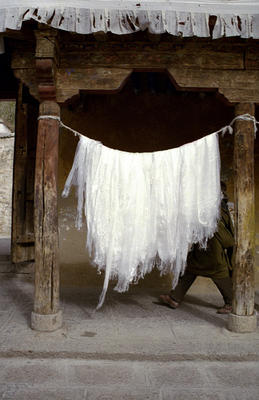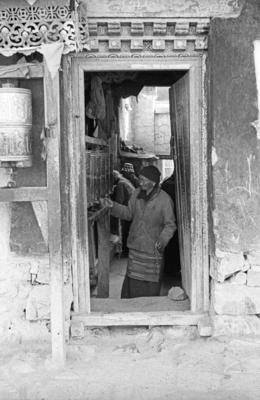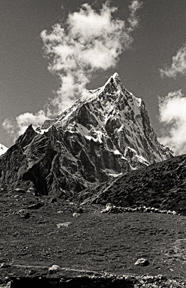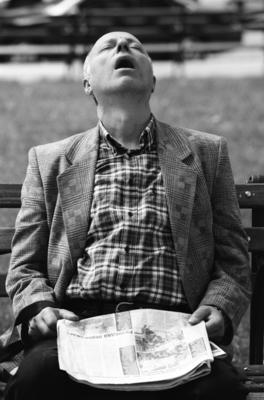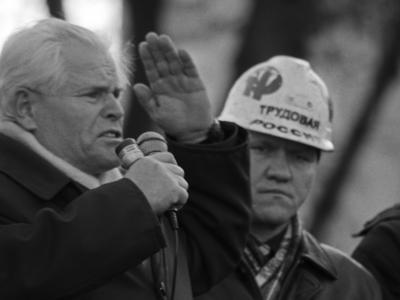Moscow
The words were enormous and full of unfamiliar characters, on the documents that were sent to me for my trip to
Moscow. The only English was on the document with the official stamp, “Visa Coupon.” I didn't know how to read Russian and it was so far from any Latin based language there was no way to guess what the words meant.
I was careful to take the documents in my hand luggage when I left for my trip.
In
the Thomson Weiterstadt, Germany office I spoke with Rainer and he told me of going to Moscow for the first time and having his entry arranged for him by Kodak. When he arrived in Moscow there were no arrangements made. He had no visa and was detained and almost deported. Kodak had to arrange a
way for him to stay in Moscow without a visa. It was then that I
thought, “Well, I’m glad I have my visa”.
The day I left for Moscow I waited in the long line at the airport. When I approached the counter the woman asked me where I was going. When I responded “Moscow”
she asked to see my visa and I produced the papers I had in my possession. She noticed the dates on the papers didn’t match my ticket and said that I may have to change my return flight. I asked if it was possible to extend my visa while I was in Russia? She said she didn’t know and phoned the authorities. She informed me that there was a time when Russia would purposely produce visas with a date that was shorter than the duration of the stay and this, she said, was so they could charge you more for a visa extension while you were in their country.
She then said the person on the phone was confident that it would be
easy to extend my visa while I was in Moscow.
When I
arrived in Moscow I entered the line for passport control. I approached the man behind the glass, gave him my passport and asked how I would extend my visa. He paused while he looked at something on the computer.
He asked to see my visa, took my papers and studied them carefully. He looked at the computer and then at the line of people waiting and back at the computer again. He left the booth and walked over to a man behind a raised desk. The desk was so tall that the border agent had to crank his neck straight up to see the man leaning forward peering down over the top of the desk. He came back over to the booth and asked me to follow him. We walked over to a bench perched against a dark gray concrete wall and he asked me to wait there. The lighting was dull florescent and It was some time before the man that was behind the raised desk stepped down and walked over. He said the
documents I had were, “how you say an invitation to come to Russia.” He continued to ask me why I didn’t have a visa. I told him I thought that was a visa. He said, "stay there and I will send your documents upstairs."
A man in a dark suit came through one of the locked doors. He asked, "is there was someone who is meeting you at the airport?"
"There should be a man with a Thomson sign that was to take me
to my hotel," I replied.
I looked up and asked if there was a phone that I could use. The man behind the raised desk said no. I noticed some payphones down the hall. I went to them, put my credit card in the slot but nothing happened. I pressed “0” several times and there was dead static coming from the receiver.
There were no slots for coins. I tried the same on the other payphone and it was the same scenario. I asked again if there was a phone I could use and the man behind the raised desk told me the phone he has doesn’t get an outside line. I asked him how to use the payphone and he told me I needed a phone card. I asked how I get a
phone card and he didn’t answer me.
I asked if there was any way to make a call without a phone card. No. I said there has to
be a way I can make a phone call, his response was “the woman who works
the phones no work on Saturday.”
The man sitting next to me offered his mobile phone. I tried calling the one number I had for
Alla, the Thomson representative in Moscow. When I dialed I heard a long message in Russian. I wanted to try to phone Rainer, but the man with the phone was taken away.
I asked the man behind the raised desk if I could use his mobile phone and offered to pay him. He asked for the telephone number, dialed the number and handed me the phone. Rainer picked up, but he couldn’t hear me. I tried a couple of other times and never got through. The network wouldn’t let me leave a
voice mail. Soon after the mobile phone failures, a man in the dark suit came through the locked door with a man carrying a Thomson sign.
He had Alla on his mobile phone. She was angry that something like this could happen. I told her no one told me what to do with the documents and that I thought they were my Visa. She said that she thought I was an experienced traveler and I told her that I’ve never been to Russia.
I
had applied for several visas and every time it was different. One wanted 2 copies of my passport and I received a paper document with an embossed stamp, others were as easy as standing in a line at the destination airport and getting a sticker in my passport and one I had to send my physical passport to the consulate. She continued to say that all the information was sent to Germany to get my visa. I said I was
asked to send in a copy of my passport to the Thomson office in
Weiterstadt to get my visa, which is what I had done. I told her that I
received several documents in the mail including the Visa coupon.
As
we continued speaking she told me that the driver had made an arraignment with the customs office. She informed me that I could pay
$350.00 in cash without a receipt or record of payment and I can stay for 3 days. I asked if there was any way to extend that for the entire week and she started getting very flustered. She told me this was the deal the driver had made. The driver took the phone from me and hung up.
I asked him if there was any way to extend the visit for a week. No answer. Alla was back on the phone. I asked her if Thomson was going to reimburse me for the money and she didn’t know. I didn’t feel comfortable with that and said if they can’t extend it then there is no reason to take their offer. I couldn’t pay because I didn’t have that kind of cash on me. The driver took the phone away from me. I tried to speak with the man in the dark suit who very impatient. I asked if I
could extend my stay for a week. He didn’t answer me. The driver and the man exchanged several words turned and walked through the locked door.
I
asked the man behind the raised desk what was happening and he said I
will be deported and I will have to spend the night here. When I asked him if I could go to the hotel he said you have to stay here and pointed to where I was sitting clarifying his statement. I looked around at the dimly lit area with bare concrete walls and dark concrete floors. There were several benches all with 4 scarcely padded seats.
The man behind the raised desk asked me to follow him. I followed him to the other side of the passport control where there were the same benches,
desks and passport windows. He asked me for my ticket.
Several others were sitting on the benches across from me against the far wall, all of them male, dark-complexioned and in there 20’s and 30’s.
I
couldn’t stop thinking about how awful it would be to spend the night here. There was no way I was going to spend the night here.
I
looked in the office where the man had gone with my ticket. I asked what was happening. A woman said there was a flight at 6am tomorrow. She handed my ticket back to me. I asked if there were any flights I could take tonight. “No flights.” I noticed that there were still several flights listed on the Arrival screen above my head. I looked for a
departure screen, but there was nothing. I asked if I could get on another flight and pointed to the arrival screen. No answer. I asked if there was someone who spoke English… “Only a little,” I asked about another airline and pointed to the screen again. I asked about going anywhere, and started mentioning other cities, London, Paris? They said
“The Lufthansa office was closed and won’t be open until tomorrow,” I
said I would pay to fly tonight and showed them some cash. One of the women came to the door with a list of flights. There was a flight to
Frankfurt in 1 1/2 hrs. on Aeroflot Russian airlines. She said I could use the pay phone. I said I didn’t have a phone card. A man sitting on the bench offered me a phone card. The woman told me I could go to the transportation desk. Another woman took me upstairs, through a locked door, out into the terminal and pointed down the hall. I took a deep breath and walked down the hall.
I walked back and forth looking for the transportation desk. I asked someone where the transportation desk was and they pointed down the hall. I walked down the hall and saw nothing. I asked another and they pointed down the hall
the other way. Written on a small sign were the words, "transfer desk," but there was no one there. Next to the desk was a door, written on that door was, "transfer lounge," I asked in the lounge. They said to go to the transfer desk and wait. I said no one was there. They didn’t answer me. I waited. I
knocked on the staff only door and no one answered. Someone walked out with a coat on and I pointed to the desk. They said to wait. I went to
another staff office and opened the door. “can you help me?” They said no. There was a shift change and I would have to wait until the person came to the desk. I walked back to the transfer desk. There was a woman behind the desk and several tourists in front of the desk. I had 1 hr and 15 minutes before the flight. A woman with a big luggage cart was trying to push her way in front of me. I stood firmly on the ground. I
thought to myself, I could knock all these people over and push my way through. Visions of police arresting me entered my mind. I waited.
I
explained to the woman what happened and asked if I could get on the next flight to Frankfurt. She looked on her computer and took me back to the Transfer Lounge where the woman could help me. She started booking the flight. It would be $400.00. I didn’t have that much cash, so another woman took my credit card and went to the passport office to get my passport than to the reservation counter outside the terminal to purchase the ticket. She came back without a ticket. I needed to be at the desk to purchase the ticket with a credit card, but I wasn’t allowed to go outside the terminal. She asked me about my bank card and code. I
gave it to her. She came back and said the bank said I had exceeded my limit. I gave her all my cash and said use what you need to and take as little as possible out of the bank. More time passed. She came back with a ticket and several receipts from the money transfers. I asked about my suitcase. They said there isn’t time to send it with me and they would put it on the Lufthansa flight tomorrow morning. We ran out of the
door and to the gate for boarding.
More to come on how I got my visa and what really happened to my suitcase…





